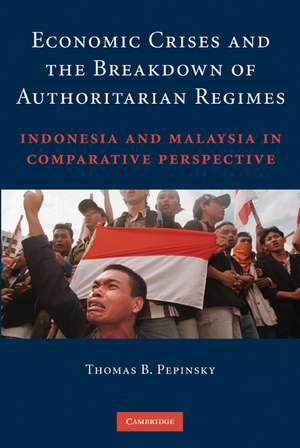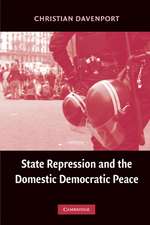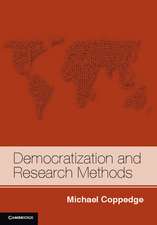Economic Crises and the Breakdown of Authoritarian Regimes: Indonesia and Malaysia in Comparative Perspective
Autor Thomas B. Pepinskyen Limba Engleză Paperback – 16 aug 2009
Preț: 264.74 lei
Nou
Puncte Express: 397
Preț estimativ în valută:
50.66€ • 55.01$ • 42.56£
50.66€ • 55.01$ • 42.56£
Carte tipărită la comandă
Livrare economică 22 aprilie-06 mai
Preluare comenzi: 021 569.72.76
Specificații
ISBN-13: 9780521744386
ISBN-10: 0521744385
Pagini: 346
Ilustrații: 17 b/w illus. 31 tables
Dimensiuni: 150 x 226 x 23 mm
Greutate: 0.48 kg
Editura: Cambridge University Press
Colecția Cambridge University Press
Locul publicării:New York, United States
ISBN-10: 0521744385
Pagini: 346
Ilustrații: 17 b/w illus. 31 tables
Dimensiuni: 150 x 226 x 23 mm
Greutate: 0.48 kg
Editura: Cambridge University Press
Colecția Cambridge University Press
Locul publicării:New York, United States
Cuprins
1. Crises, adjustment, and transitions; 2. Coalitional sources of adjustment and regime survival; 3. Authoritarian support coalitions: comparing Indonesia and Malaysia; 4. Adjustment policy in Indonesia, June 1997–May 1998; 5. Adjustment policy in Malaysia, June 1997–December 1999; 6. Authoritarian breakdown in Indonesia; 7. Authoritarian stability in Malaysia; 8. Cross-national perspectives; 9. Conclusions.
Recenzii
'This is an outstanding piece of scholarship, with innovative theorizing, a creative use of multiple methods, and a careful and nuanced analysis of various country experiences. Pepinsky's book tackles the elephant in the room in the crisis transitions literature – why do some crises lead to regime change while most others do not? The recognition that during crises adjustment policy and regime survival are two battles being fought simultaneously is an important insight. Adjustment is inherently political and Pepinsky's approach marries the economic exigencies of a crisis with the political realities leaders face, and explores when these two things are (or are not) compatible.' Allen Hicken, University of Michigan
'What explains the strikingly different policy and political reactions of the Malaysian and Indonesian governments to the 1997–1998 Asian financial crisis? Why did Malaysia under Mahathir turn inward economically, maintaining its authoritarian politics, while the Indonesian dictatorship under Suharto failed to formulate a coherent policy response, then collapsed and was soon transformed into a democracy? Pepinsky argues that it was not the usual suspects of left or right, class conflict or macro-institutional patterns, but rather the regime-constructed political coalitions – cohesive in Malaysia, divided in Indonesia on crucial economic policies – that made the difference. His answer is original and persuasive. This is the political economy of development at its most productive, advancing theoretical understanding through sophisticated, fine-grained case studies based on extensive field work in both countries.' R. William Liddle, The Ohio State University
'As against all the ad hoc and ad hominem accounts of Suharto and Mahathir, and against the false promise of a narrowly institutionalist analysis, Pepinsky's close and careful comparative study of economic crises and regime transitions in Southeast Asia demonstrates the abiding importance of understanding the complex interplay of economic interests for explaining policy choices and political outcomes. This kind of emphasis on social forces and the social embeddedness of policies and politics is long overdue and extremely welcome.' John T. Sidel, London School of Economics and Political Science
'What explains the strikingly different policy and political reactions of the Malaysian and Indonesian governments to the 1997–1998 Asian financial crisis? Why did Malaysia under Mahathir turn inward economically, maintaining its authoritarian politics, while the Indonesian dictatorship under Suharto failed to formulate a coherent policy response, then collapsed and was soon transformed into a democracy? Pepinsky argues that it was not the usual suspects of left or right, class conflict or macro-institutional patterns, but rather the regime-constructed political coalitions – cohesive in Malaysia, divided in Indonesia on crucial economic policies – that made the difference. His answer is original and persuasive. This is the political economy of development at its most productive, advancing theoretical understanding through sophisticated, fine-grained case studies based on extensive field work in both countries.' R. William Liddle, The Ohio State University
'As against all the ad hoc and ad hominem accounts of Suharto and Mahathir, and against the false promise of a narrowly institutionalist analysis, Pepinsky's close and careful comparative study of economic crises and regime transitions in Southeast Asia demonstrates the abiding importance of understanding the complex interplay of economic interests for explaining policy choices and political outcomes. This kind of emphasis on social forces and the social embeddedness of policies and politics is long overdue and extremely welcome.' John T. Sidel, London School of Economics and Political Science
Notă biografică
Descriere
Thomas B. Pepinsky examines how coalitions and capital mobility in Indonesia and Malaysia shape the links between financial crises and regime change.









